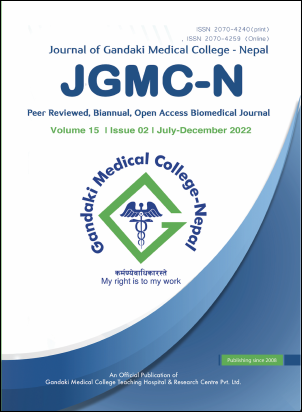Detection of Salmonella carriers among apparently healthy cafeteria food handlers in tertiary care centre Pokhara
DOI:
https://doi.org/10.3126/jgmcn.v15i2.47571Keywords:
Antibiogram, food handlers, personnel hygiene, SalmonellaAbstract
Introduction: Foodborne illnesses are caused by consumption of contaminated foods. The risk of food getting contaminated depends largely on the health status of the food handlers, their personal hygiene, knowledge and practice of food hygiene. Hence, this study aimed to assess the proportion of Salmonella among food handlers working in the cafeteria of Gandaki Medical College Teaching Hospital, Pokhara, Nepal.
Methods: An institutional based cross-sectional analytical study was conducted from March 2018 to February 2019. A structured questionnaire was used to collect the sociodemographic characteristics, the knowledge and the risk factors of the participants. A total of 62 stool samples were collected and processed according to the standard microbiological procedures. All the Salmonella isolates were identified by biochemical tests. Additionally, antimicrobial susceptibility tests were performed according to Clinical and Laboratory Standards Institute guidelines 2017, using Kirby-Baur disk diffusion method. Data were analyzed by Statistical Package for Social Service for window version 21.0. Descriptive statistics were computed and chi-square test was applied at 5% level of significance. P-value <0.05 was considered to be statistically significant.
Results: Total of 62 food handlers were included in the study. Majority of the cafeteria workers 46(74.2%) were not aware of proper hand washing technique. Of the 62 food handlers working in the cafeteria, Salmonella were isolated from 12(19.4%) stool specimens. All the Salmonella isolates were sensitive to amikacin (100%), followed by imipenem (91.7%) and cefotaxime (91.7%). However, the highest rate of antibiotic resistance among Salmonella isolates was noted for amoxicillin (58.3%).
Conclusions: This study showed increased proportion of Salmonella carriers among the food handlers of cafeteria. Salmonella carriage among food handlers is of great concern as they can be the source of foodborne illness. Therefore, educating the food handlers of cafeteria about personnel hygiene may play a pivotal role in minimizing the incidence of foodborne illness and the associated morbidity
Downloads
Downloads
Published
How to Cite
Issue
Section
License
Copyright (c) 2022 Sushil Kumar Chaudhary, Sanjib Mani Regmi, Sunita Devkota, Gyanendra Gautam, Shanti Pradhan, Amar Nagila

This work is licensed under a Creative Commons Attribution-NonCommercial 4.0 International License.
This license allows reusers to distribute, remix, adapt, and build upon the material in any medium or format for noncommercial purposes only, and only so long as attribution is given to the creator.




